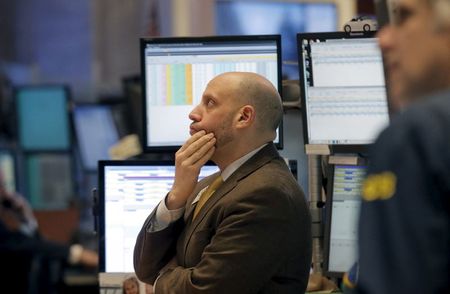By Herbert Lash and Lewis Krauskopf
NEW YORK (Reuters) -Global equities and benchmark U.S. bond yields tumbled on Friday in volatile trade after data showed U.S. job growth slowed considerably in November and the Omicron variant of the coronavirus kept investors on edge.
Nonfarm payrolls increased by 210,000 jobs, the fewest since last December, but the unemployment rate plunged to a 21-month low of 4.2% and 594,000 people entered the labor force, the most in 13 months, indicating a rapidly tightening labor market.
Despite weak jobs growth, solid details in the Labor Department report suggested Federal Reserve plans to accelerate tapering of its bond purchases and expectations for multiple rate hikes next year remained intact.
The yield on 10-year U.S. Treasury notes fell 9.8 basis points to 1.351% and the tech-heavy Nasdaq Composite stock index slid almost 3% at one point as investors anticipated slower economic growth next year.
“The market is saying the Fed is going to make a serious policy error by raising rates too quickly,” said Joe LaVorgna, chief economist for the Americas at Natixis. “Everything is working toward a much weaker growth backdrop; that is what the market senses, and the virus is occurring in the backdrop.”
The Treasury yield curve measuring the gap between yields on two- and 10-year Treasury notes, seen as an indicator of economic expectations, narrowed to 77.0 basis points, down from almost 130 points in early October.
Recent global economic growth projections from the International Monetary Fund are likely be downgraded due to the emergence of the Omicron variant, said IMF Managing Director Kristalina Georgieva.
Omicron has gained a foothold in many countries worldwide and many governments have restricted travel rules to curb the variant.
“The top issue is still this whole Omicron variant. There are enormous amounts of uncertainty there,” said Randy Frederick, vice president of trading and derivatives for Charles Schwab in Austin, Texas.
Oil prices fell and gold prices rose almost 1% as the plunge in U.S. Treasury yields boosted the safe-haven metal’s appeal.
MSCI’s all-country world index fell 0.81% and the broad STOXX Europe 600 index closed down 0.6%.
Stocks on Wall Street pared heavy, earlier losses. The Dow Jones Industrial Average closed down 0.17%, the S&P 500 fell 0.84% and the Nasdaq Composite lost 1.92%.
The safe-haven Japanese yen and Swiss franc gained as market sentiment soured.
The dollar index, which tracks the greenback versus a basket of six currencies, rose 0.07% to 96.161.
The euro gained 0.06% to $1.1306, while the yen fell 0.36% to $112.7400.
Crude prices ended little changed after erasing gains of more than $2 a barrel on growing worries that rising coronavirus cases could reduce global oil demand.
Crude prices edged higher after producer group OPEC+ said it could review its policy to hike output at short notice if a rising number of pandemic lockdowns chokes off demand.
Brent futures rose 21 cents to settle at $69.88 a barrel, while U.S. West Texas Intermediate (WTI) crude ended 24 cents lower at $66.26 a barrel.
U.S. gold futures settled 1.2% higher at $1,783.90 an ounce.
Bitcoin fell 5.00% at $53,720.0400.
(Reporting by Herbert Lash, with additional reporting by Karen Pierog in Chicago, Dhara Ranasinghe in London; Editing by Richard Chang)











